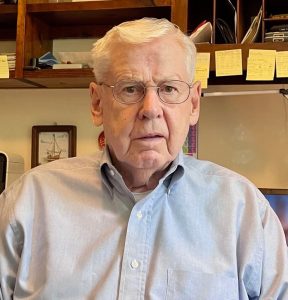Known as Project FRESH Air, it brings faculty and students together with local schools to monitor air quality, an on-the-ground way of building awareness of climate change and educating the next generation of climate activists.
McGroddy made a gift in support of the project. Then he learned about the University’s core curriculum revisions, aimed at fostering cross-disciplinary thinking, and decided to give again—seeing in the University’s various efforts the kind of forward-looking approach in which he has long sought to invest.

His new gift created the James C. McGroddy Award for Innovation in Education, which carries a cash prize. In April, the University announced the first recipients: three professors who had found an inventive way of teaching chemistry students about machine learning. (See related story.)
The gift reflects McGroddy’s deeply held belief in preparing students to handle future challenges—and seize future opportunities—that are just now taking shape.
“I see Fordham as aiming to lead change, being ahead of the wave rather than following, and that’s what motivates my support,” he said.
Forward-Looking Jesuit Education
McGroddy has long been familiar with Fordham. His father and brother graduated from the University, and he attended Jesuit schools himself—New York’s Regis High School and St. Joseph’s University in Philadelphia—before earning his doctorate in physics from the University of Maryland.
His views on education gelled during his student years and during his 32-year career with IBM, from which he retired as senior vice president of research in 1996. At St. Joseph’s, he studied electronic physics, a nontraditional major that combined in-depth education in science fundamentals with full-time work experience to prepare students for careers in the transistor and digital revolution, then in its infancy.
McGroddy credits much of his career success to that major, and education became one of his career’s through lines. During and after his IBM career, he focused on university-industry collaboration and served as a visiting lecturer and member of multiple university advisory boards and visiting committees, both in the U.S. and abroad. During a sabbatical from IBM he was a visiting professor at the Technical University of Denmark, and he later helped establish the IT University of Copenhagen.
Preparation for Health Care, Energy, Immunology Challenges
Since his retirement from IBM, a major focus for his philanthropy and consulting has been education, particularly science and technology education that balances “learning about” with “learning how to,” he said.
The emerging challenges for today’s students include developing alternative energy sources; building on “amazing” progress in the fields of genetic science and immunology; and changing the nation’s health care industry to create a system that achieves better results as well as lower costs, he said.
“Helping students develop a profile that will enable them to succeed, and lead, in the world which we imperfectly see ahead must be the key driver of educational innovation, and will be the hallmark of leading universities in the challenging years before us,” McGroddy said.
Learn about other opportunities to invest in academic excellence or other pillars of the Fordham experience at the site for the University’s $350 million fundraising campaign, Cura Personalis | For Every Fordham Student. To inquire about giving to any area of the University, please contact Michael Boyd, senior associate vice president for development and university relations, at 212-636-6525 or [email protected].
]]>